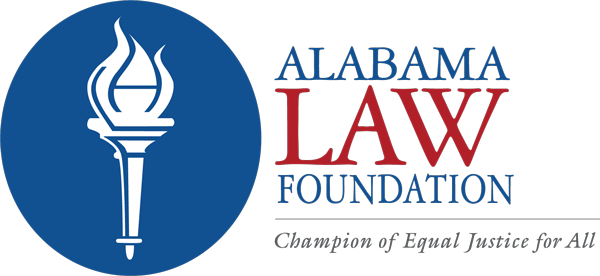Grantee Stories
Volunteer Lawyer Programs
Volunteer lawyers bridge the gap to provide essential legal representation for the most vulnerable among us, who might now otherwise have access to justice. The Alabama Law Foundation is proud to support the work of these important organizations through our grant program. In 2022, programs providing civil legal services for low-income Alabamians collectively received grants totaling $846,100. Watch the video below to hear from leaders of Alabama’s Volunteer Lawyer Programs about how pro bono service benefits those in need.
Equal Justice Initiative
Bryan Stevenson, Executive Director of Equal Justice Initiative, explains that Alabama is one of a very few states that does not have a statewide public defender system. Any lawyer, regardless of experience or specific expertise, can be appointed as a defense attorney for an indigent client in a criminal case. Even in death penalty cases, “poor people accused of crimes are appointed lawyers from the local bar who are often unprepared and always underpaid.” Attorney Rick Davidson, a general civil practitioner, explains that when he began preparing for a death penalty case, he “quickly became overwhelmed.” There were many aspects to the defense, and he “would not have known where to start without the resources Bryan and the Equal Justice Initiative provided.”
As a result of inadequate representation, poor people in Alabama are being sentenced to death at record levels; in the past few years, Alabama sentenced more people to death per capita than any other state in the country. Many of the condemned are innocent. According to national statistics, for every eight death row inmates, one innocent person is identified. Stevenson explains that although DNA testing gets a lot of media attention, it accounts for only 15% of those found innocent. Most death row prisoners who are found innocent are recipients of investigative legal work that exposes problems in the case.
Obviously, lawyers without criminal law expertise need assistance to provide effective representation. Lawyers who are lucky enough (and whose clients are lucky enough) to find their way to the Equal Justice Initiative find assistance. Davidson continues that as a civil attorney, he “would not have had any confidence defending a death penalty case without the Equal Justice Initiative staff’s experience, expertise and willingness to help.”
Equal Justice Initiative “challenges the hopelessness that often plagues the administration of justice for the poor and disadvantaged and bridges the tremendous gap that separates legal services for the poor and the affluent in the criminal justice system.”
The Alabama Law Foundation knows that the building blocks of that bridge are attorneys who are prepared. The Equal Justice Initiative and the Alabama Law Foundation work together to assist lawyers, to give access to justice to the poor, and to make Alabama’s current criminal justice system a proud example of that cherished belief in equal justice for all citizens.
YWCA “Justice on Wheels” Program
The YWCA of Central Alabama’s domestic violence services include two shelters, a 24 hour crisis hotline, individual court advocacy, and legal representation. The program serves a three-county area: Jefferson, St. Clair and Blount counties. Although the city of Birmingham, population 212,237, is located in Jefferson County and considered an urban center, the rural population of Jefferson county is almost double and is identified as having areas with deep pockets of unemployment and poverty. These characteristics are shared by residents of St. Clair and Blount counties which also suffer a lack of meaningful social services and present significant social and cultural challenges associated with geographical isolation. Through its history of serving victims of domestic violence, the YWCA identified the tremendous need to provide legal services to victims of domestic violence who are isolated due to location, poverty, or their living situation. Beyond the obvious issues of protection orders, divorce, child custody and support, a battered woman often faces other legal obstacles brought about by her financial condition such as foreclosure on her home or loss of employment. Director Jennifer Caraway J.D. explains that many women in the rural areas of Jefferson, St. Clair, and Blount counties “have no access to legal services,” and these women often find traveling to an urban center for help is impossible. Often a victim in these areas has little or no resources to generate income to pay an attorney; some do not have driver’s licenses or cars; some do not have access to telephones. Some fear traveling into a city to access services.
In these cases, the YWCA’s “Justice on Wheels” comes to them. **The logistics are simple: A paralegal and an attorney travel by van to safe, public places and meet with women who want and need to leave an abusive situation. The YWCA has utilized community connections to find these locations where the women can safely seek legal counsel. Director Jennifer Caraway explains that women in an abusive situation are often in dire need of legal assistance in dealing with the many problems caused by domestic abuse such as safety, shelter, child custody, and child support. In the program’s pilot year, 2010, eighty-two women received assistance.
